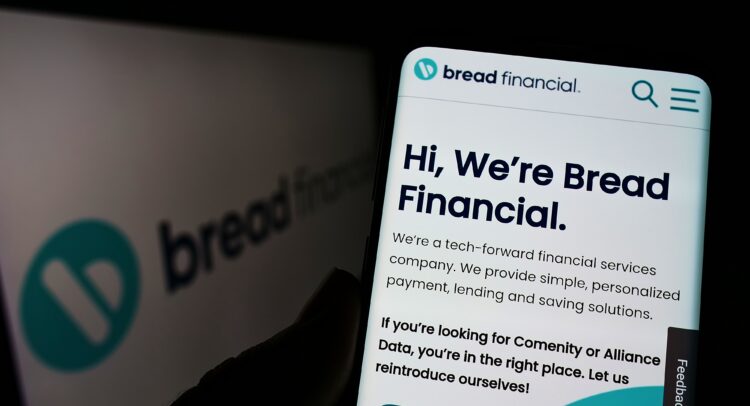Bread Financial Holdings (NYSE:BFH) shares are up more than 55% over the past 12 months. Prior to its recent first-quarter update, the consumer finance company had outperformed consensus earnings estimates for six consecutive quarters. Given the momentum, the former $300 stock may seem like a worthwhile investment. However, a challenging consumer spending environment may continue to weigh on near-term financial results. On top of a potentially detrimental regulatory change, I believe BFH stock is one to avoid for now.
Discover the Best Stocks and Maximize Your Portfolio:
- See what stocks are receiving strong buy ratings from top-rated analysts.
- Filter, analyze, and streamline your search for investment opportunities with TipRanks’ Stock Screener.

Based in Columbus, Ohio, Bread Financial offers a range of financial services to individuals, including credit cards, loans, and high-yield savings accounts. Formerly Alliance Data Systems, the digital-first company helps finance brands grow in addition to providing various direct-to-consumer solutions.
Since revisiting pandemic lows in the $20s last year, Bread Financial shares have returned to the low $40s. Investors shrugged off disappointing first-quarter results, including a 23% year-over-year revenue drop that led to weaker-than-expected profits. Higher interest expenses, higher credit losses, and lower late fee revenue were all to blame. The company’s decision to sell its BJ’s Wholesale Club card business in February 2023 also contributed to the revenue shortfall.
I like Bread Financial’s long-term potential to benefit from digital finance growth, but I am neutral on the stock for now. The first-quarter report suggests that a soft consumer spending environment will continue to hurt near-term financials.
Inflation, high interest rates, and tight credit conditions will make it difficult for Bread Financial’s core credit business to grow in 2024. A hotly contested overhaul to credit card late fee regulation could make things worse. For these reasons, my view is consistent with the stock’s Neutral Smart Score of 7 out of 10.
Let’s dive into the latest happenings in the credit late fee battle and what Wall Street thinks of Bread Financial stock.
Credit Card Late Fee Issue Is in Limbo
In March 2024, the Consumer Financial Protection Bureau (CFPB) announced a ban on “excessive” credit card late fees. The CFPB and financial sector critics have long argued that such fees target lower-income households and people of color.
Last week, a federal judge in Texas blocked the new Biden administration rule that would cap the credit card late fee at $8. This would be a drastic reduction from the typical fee of $30 or more. The judge granted a banking industry injunction to freeze the restriction that was set to take effect on May 14th. This was a big win for consumer finance companies like Bread Financial, which generate significant revenue from late fees—but it’s one that may be temporary.
Although the court ruled that the new limit exceeds the CFPB’s scope of authority, consumer advocacy groups are pushing back on the decision. This suggests that the late fee legal fight will continue and may even reach the Supreme Court. Given the wide disparity between the government proposal and current late fees, it seems like there is plenty of middle ground on which to reach a compromise. Perhaps a cap of $15 or $20 will eventually make both parties happy.
Regardless, the fact that the issue isn’t going away is a negative for Bread Financial. The uncertainty is a source of risk and a reason to stay on the sidelines for now.
Analyst Views of Bread Financial Vary Widely
Wall Street research groups also can’t agree when it comes to Bread Financial stock. Of the opinions presented over the last three months, most analysts are neutral. BFH currently has seven Hold ratings compared to three Buys and one Sell.
One of the company’s newest bulls is Keefe Bruyette’s Sanjay Sakhrani. Earlier this month, the five-star analyst upgraded the company from Market Perform (Hold) to Outperform (Buy). Sakhrani, who has an impressive 70% success rate, also upgraded credit services peer Synchrony Financial (NYSE:SYF) to Market Perform this month. On Monday, Bread Financial got another Buy rating courtesy of Bill Ryan at Seaport Research.
At the other end of the spectrum is Terry Ma from Barclays (NYSE:BCS). Following Bread Financial’s first quarter earnings update, the analyst maintained a Sell rating.
While I understand the potential reasons to avoid Bread Financial, I wouldn’t go so far as to call it a Sell. The downside seems fairly limited from here, considering the stock’s value proposition. For starters, it is trading around 7.5x this year’s earnings estimate. A 2.1% dividend yield and active buyback program further suggest that BFH offers decent value.
What Is the Consensus Price Target for BFH Stock?
Bread Financial stock has an average price target of $41.10, which equates to 2.65% downside potential. Keep in mind, however, that analyst opinions of the stock vary widely, as do their price targets. Targets range from $26.00 to $67.00, implying 38.4% downside and 59% upside, respectively.

The Bottom Line on BFH Stock
Bread Financial is feeling the impact of a cautious consumer spending environment — especially given its client exposure to discretionary categories like airlines, cruise lines, and department stores. The outcome of the credit card late fee court battle, as well as the company’s June 18th Investor Day event, could determine whether Bread keeps rising — or becomes toast.









